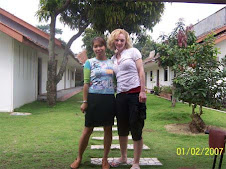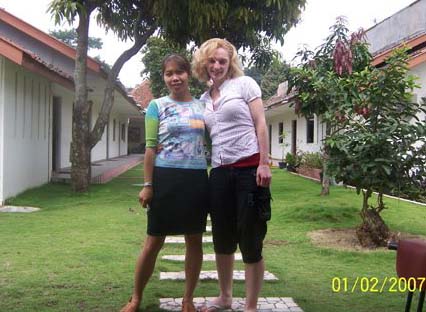Pronunciation Guide
Indonesian language is almost exclusively written in Romanized script with Dutch influence is obvious in the spelling and transcription. You will be happy to know that Indonesian pronunciation is very regular. With one or two exceptions what you see is what you say. The pronunciation of the alphabet is almost similar to that of Dutch.
The guide below will help you pronounce Indonesian in an acceptable way. With only very few exceptions, separate letters or certain combinations always have the same pronunciation.
Vowel Sounds
The vowel “a” in open syllables is pronounced more or less like the a in “star” or “bar”
lima = five
suka = like
sama = same
While in closed syllables it sounds like the English u in “but”
berat = heavy
surat = letter
The vowel “e”has two distinct sounds. When unstressed it is pronounced as the mute e in “open” or “again”
keras = hard
lembut = soft
empat = four
When stressed, it sounds somewhere between the e in “bed” and the a in “bad”
bebek = duck
lem = glue
meja = table
It is surprising that most textbooks and dictionaries, even those intended for foreign learners of the language, do not point this out, especially as it occurs in some very common words.
The vowel “i” in open syllables is pronounced as the ee in “teeth”
ini = this
ikan = fish
lima = five
The vowel “o” is pronounced like the a in “ball” or “mall”
tolong = help/please
kosong = empty
The vowel “u” is pronounced like the oo in “fool”
lucu = funny
duduk = sit
lupa = forget
Consonant Sounds
Most Indonesian consonants are pronounced as in English:
b biru blue
d dadu dice
f foto photo
g guru teacher
h hari day
j jam clock
k kuat strong
l lebar wide
m mau want
n nanti later
p panas hot
s susu milk
t teh tea
v vegetarian vegetarian
w warna colour
y ya yes
z zebra zebra
however:
The consonant “r” is always rolled and audible:
beras rice
besar big
Stress
There is in general no strong stress in Indonesian. Nearly all syllables have equal length.
The guide below will help you pronounce Indonesian in an acceptable way. With only very few exceptions, separate letters or certain combinations always have the same pronunciation.
Vowel Sounds
The vowel “a” in open syllables is pronounced more or less like the a in “star” or “bar”
lima = five
suka = like
sama = same
While in closed syllables it sounds like the English u in “but”
berat = heavy
surat = letter
The vowel “e”has two distinct sounds. When unstressed it is pronounced as the mute e in “open” or “again”
keras = hard
lembut = soft
empat = four
When stressed, it sounds somewhere between the e in “bed” and the a in “bad”
bebek = duck
lem = glue
meja = table
It is surprising that most textbooks and dictionaries, even those intended for foreign learners of the language, do not point this out, especially as it occurs in some very common words.
The vowel “i” in open syllables is pronounced as the ee in “teeth”
ini = this
ikan = fish
lima = five
The vowel “o” is pronounced like the a in “ball” or “mall”
tolong = help/please
kosong = empty
The vowel “u” is pronounced like the oo in “fool”
lucu = funny
duduk = sit
lupa = forget
Consonant Sounds
Most Indonesian consonants are pronounced as in English:
b biru blue
d dadu dice
f foto photo
g guru teacher
h hari day
j jam clock
k kuat strong
l lebar wide
m mau want
n nanti later
p panas hot
s susu milk
t teh tea
v vegetarian vegetarian
w warna colour
y ya yes
z zebra zebra
however:
The consonant “r” is always rolled and audible:
beras rice
besar big
Stress
There is in general no strong stress in Indonesian. Nearly all syllables have equal length.










No comments:
Post a Comment